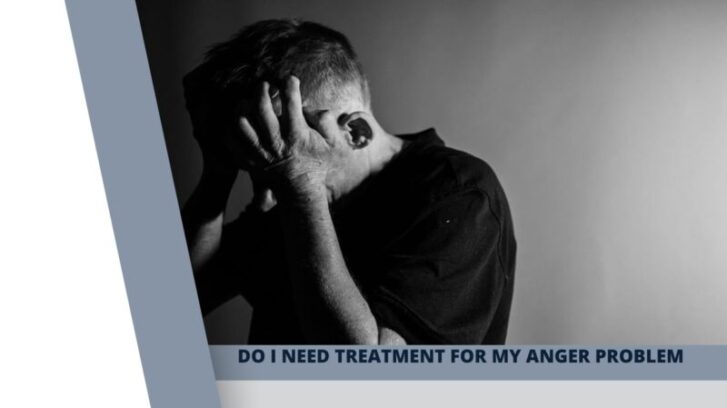In the pantheon of human emotions, anger holds a powerful position. It can be a force for good when it’s directed towards rectifying wrongs and injustices. However, when it becomes uncontrollable and destructive, it morphs into a problem that could require professional help.
The line between normal and an anger problem is often blurred, causing confusion and delay in seeking help. This comprehensive blog post will equip you with the knowledge and understanding to make informed decisions about addressing potential anger issues.
Discuss the Prevalence and Impact in Society
Uncontrolled anger is a pressing issue, not just on an individual level but also from a societal perspective. It contributes to various social problems such as violence, crime, and the breakdown of family and community relationships.
Workplace productivity can also be adversely affected when employees struggle with unresolved anger, leading to an unhealthy working environment, increased conflicts, and reduced morale and performance. Furthermore, it could potentially fuel societal divisions if they remain unchecked.
However, the silver lining is that increased awareness and understanding problems can lead to more effective interventions and treatments. As a society, it’s important to shift from stigmatizing issues to acknowledging them as legitimate mental health concerns that deserve care, understanding, and professional help.
Signs and Symptoms Of Anger
It’s critical to understand that becomes a problem when it’s disproportionate to the situation, lasts longer than it should, occurs frequently, or results in destructive behavior. Anger is not limited to shouting matches and physical altercations. It can manifest as passive-aggressive behavior, sarcasm, silent treatment, or neglect. Also, it’s essential to note that individuals suffering from anger problems might not always recognize their behavior as problematic, making self-observation and introspection vital tools in identifying issues.
Individuals with problems might also suffer from physical symptoms due to the high levels of stress associated with constant anger. These can include headaches, digestion problems, heart palpitations, high blood pressure, and even an increased risk of heart disease. Understanding these physical manifestations is equally important in recognizing an anger problem.
Understanding the Underlying Causes
Anger can often serve as a protective veneer for underlying issues. It’s frequently a secondary emotion to feelings of hurt, fear, or frustration. This complexity of emotions makes it crucial to explore and understand what fuels anger. For some, it might be past traumas or adverse childhood experiences. For others, chronic stress, life pressures, or unresolved conflicts can be the trigger points.
Underlying mental health conditions, such as depression or anxiety disorders, can also give rise to anger problems. Sometimes, anger problems might be indicative of more serious mental health disorders, such as bipolar disorder, borderline personality disorder, or intermittent explosive disorder. In such instances, treating the primary disorder is crucial for managing the associated anger issues.
The Consequences of Untreated
The consequences of untreated anger problems extend far beyond the immediate damage caused by angry outbursts. On a personal level, uncontrolled anger can lead to feelings of guilt, regret, and self-blame. It can be a barrier to personal growth and well-being, leading to a reduced quality of life. Also, persistent can lead to physical health issues, including heart disease, stroke, and a weakened immune system due to chronic stress.
On a relational level, frequent outbursts can lead to a breakdown of interpersonal relationships, causing family strife, marital conflict, and difficulties in forming and maintaining friendships. It can also impact professional relationships, affecting job performance and job satisfaction. When left untreated, problems can lead to social isolation, job loss, or even legal trouble in extreme cases.
Differentiating Between Normal and Problematic Anger
Anger, in and of itself, is a normal and healthy human emotion. It alerts us to perceived wrongs and injustices and motivates us to take action. However, anger becomes a problem when it’s excessive or poorly managed. It’s important to note that the severity of the provocation, the intensity, the duration of the anger, the frequency of angry outbursts, and the impact of the anger on yourself and others are all factors in determining whether it is problematic.
Problematic can interfere with your ability to think clearly, make rational decisions, and effectively solve problems. It can lead to aggressive behavior, causing harm to yourself or others. It can also affect your physical health, contributing to problems such as headaches, insomnia, high blood pressure, and digestive problems. Understanding this distinction between normal and problematic anger is crucial in identifying whether you need help for your anger.
Types of Treatment Options Available
There are several treatment options available for managing problems. These include individual therapy, where you work one-on-one with a therapist to understand the root causes of your anger and develop effective coping strategies. Group therapy is another option where individuals with similar issues come together under the guidance of a professional to share experiences, learn from each other, and provide mutual support.
Anger management programs focus on teaching specific skills to handle effectively. These skills include identifying triggers, learning relaxation techniques, improving communication skills, changing negative thought patterns, and problem-solving. Cognitive-behavioral therapy (CBT) is a common therapeutic approach used in these programs, helping individuals understand the relationship between thoughts, feelings, and behavior.
In some cases, medication might be used alongside therapy, especially if there are underlying mental health conditions contributing to the problem. It’s important to discuss these options with a mental health professional to determine the best course of treatment for your unique needs.
Benefits of Anger Management Therapy
Engaging in anger management therapy can lead to numerous benefits. Improved emotional regulation is a key benefit, equipping you with the skills to manage not just anger but also other emotions more effectively. This can lead to improved self-confidence and a sense of empowerment, as you’re no longer at the mercy of your emotions.
Improved communication skills are another benefit. Anger management therapy often involves learning assertive communication skills, helping you express your needs and concerns clearly and respectfully without resorting to aggression. This can lead to improved relationships with your kids, family and others, as you’re better able to resolve conflicts, negotiate solutions, and build mutual understanding.
Better relationship quality is yet another benefit of therapy. Uncontrolled anger can damage relationships, but by learning to manage, you can start repairing those relationships and building stronger, healthier connections. Increased self-awareness, greater empathy, and improved patience are some of the other potential benefits of engaging in therapy.
Self-help Strategies for Managing
While professional help is crucial for managing anger problems, there are several self-help strategies that you can incorporate into your daily life. Deep breathing exercises, for example, can help calm your nervous system and reduce feelings. Similarly, progressive muscle relaxation, where you systematically tense and relax different muscle groups, can also help reduce feelings of anger and promote relaxation.
Mindfulness practices, such as meditation and yoga, can also be effective in managing anger. Mindfulness involves focusing your attention on the present moment without judgment. By practicing mindfulness, you can learn to observe your feelings without reacting to them impulsively.
Role of Support Networks
When dealing with anger problems, having a strong support system can be immensely beneficial. Your support network may consist of family members, close friends, or even support groups specifically focused on anger management. These individuals can provide understanding, empathy, and encouragement throughout your journey.
Support networks play a crucial role in holding you accountable for your actions and helping you stay on track with your goals. They can offer a safe space to express your feelings and frustrations, providing alternative perspectives and constructive feedback. Having people who are rooting for your success and well-being can make a significant difference in your ability to manage anger effectively.
Seeking Professional Help
Despite the availability of treatment options and the benefits they offer, there can be barriers that prevent individuals from seeking professional help for their anger problems. Stigma surrounding mental health issues, including problems, can lead to feelings of shame and reluctance to reach out for support. Denial of the problem or the belief that one can handle it on their own can also hinder seeking professional help.
However, it’s essential to recognize that seeking professional help is a sign of strength and self-awareness. Mental health professionals are trained to understand and support individuals with anger problems. They can provide you with a safe and non-judgmental space to explore the underlying causes of your anger and develop effective coping strategies.
When to Seek Immediate Help
While many anger issues can be managed through therapy and self-help strategies, there are situations where immediate professional help is necessary. If your anger escalates to physical violence or poses a threat to yourself or others, it is essential to seek immediate assistance. In such instances, contacting emergency services or a crisis hotline can provide you with the necessary support and intervention.
Additionally, if you experience intense and uncontrollable anger that significantly impacts your daily life, relationships, or overall functioning, it’s crucial to reach out to a mental health professional. They can assess the severity of your anger problem and determine the most appropriate course of treatment.
Benefits of Early Intervention
Early intervention is key when it comes to managing anger problems effectively. Addressing anger issues early on increases the likelihood of successful treatment outcomes. By seeking help at the earliest signs of an anger problem, you can prevent further negative consequences and reduce the impact on your life and relationships.
Early intervention also allows you to develop healthy coping mechanisms and communication skills before the anger becomes deeply ingrained and more challenging to manage. By addressing anger problems promptly, you can improve your overall well-being and quality of life.
Treatment Considerations for Specific Populations
Different populations may require tailored treatment approaches when addressing. For children and adolescents, therapy techniques may need to be adapted to their developmental stage and understanding. Play therapy, art therapy, or cognitive-behavioral therapy specifically designed for younger individuals can be effective in helping them manage their anger.
Adults may benefit from individual therapy that explores the root causes of their anger and provides practical tools for management. Additionally, adults with co-occurring mental health conditions may require an integrated treatment approach that addresses both the underlying mental health issues and the problems.
It’s important to seek out mental health professionals who have experience and expertise in working with specific populations or co-occurring conditions. Their specialized knowledge will ensure that you receive the most appropriate and effective treatment for your unique needs.
Collaborative Treatment Approach
Collaboration between mental health professionals, physicians, and other healthcare providers is essential when it comes to treating anger problems effectively. The multidisciplinary approach ensures that all aspects of an individual’s health are considered, and any underlying medical conditions or medication interactions are taken into account.
Collaboration between professionals also allows for a comprehensive understanding of the individual’s background, experiences, and challenges. This holistic approach ensures that the treatment plan addresses the individual’s unique circumstances and provides the best chance for successful outcomes.
Overcoming Resistance to Treatment
Resistance to treatment is a common hurdle when it comes to addressing anger problems. It can manifest as skepticism, denial, or fear of change. However, it’s important to remember that change is possible and seeking treatment is a positive step towards personal growth and improved well-being.
To overcome resistance, it can be helpful to challenge any negative beliefs or misconceptions you may have about therapy or treatment. Engage in open and honest conversations with a mental health professional who can address your concerns and provide reassurance. Consider the potential benefits of treatment and envision the positive changes it can bring to your life.
It’s also important to be patient with yourself throughout the process. Healing and growth take time, and setbacks are a normal part of the journey. With the support of a therapist and a strong support network, you can overcome resistance and foster a positive attitude towards seeking and engaging in treatment.
Conclusion
Recognizing and addressing problems is crucial for personal growth, healthy relationships, and overall well-being. By understanding the signs and symptoms, underlying causes, and consequences of untreated anger problems, individuals can make informed decisions about seeking treatment.
There are various treatment options available, including therapy, anger management programs, and medication, which can help individuals gain better control over their anger. Engaging in management therapy offers numerous benefits, including improved emotional regulation, enhanced communication skills, and better relationship quality.
Related Posts:
- Effective Anxiety Disorder Treatments: Unlocking Peace
- 8 Benefits of Probiotics For Women's Health -…
- Dream Within a Dream: Scenario, Meaning & Interpretation
- 6 Best Hair Growth Oil in 2024 - Finding the Best…
- 16 Best Mental Health Blogs 2024 - Finding Hope and Support
- What is Anger Management? Tips for Keeping Your Cool

















